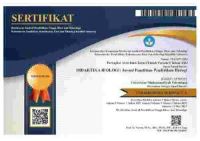COMPARISON OF PROJECT-BASED LEARNING AND DISCOVERY LEARNING ON BIOLOGY LEARNING OUTCOMES BY CONTROLLING STUDENTS’ INITIAL KNOWLEDGE
Abstract
The study aimed to compare the influence of project-based learning and discovery learning models on biology learning outcomes by controlling students' initial knowledge. The aim of this study was also to analyze the role of initial knowledge in learning by involving the both learning models. The study was conducted in State Senior High School 4 Kendari using quasi-experimental design (Non-equivalent pretest and posttest control-group). The samples were conducted by a random sampling technique, Class XI MIA 1 as the experimental class and Class XI MIA 4 as a control class. The variables consisted of: a) biology learning outcomes as the dependent variable; b) learning models (project-based learning and discovery learning) as the independent variables; and c) students' initial knowledge as the covariate variable. The data were analyzed using ANCOVA at a significance level 0.05. The study results showed there was significant difference of biology learning outcomes between students that taught using the project-based learning and students taught using the discovery learning by controlling the initial knowledge (sig. 0.025 < ? 0.05). The average of students’ biology learning outcomes that taught using the project-based learning (76.63) was higher than students taught using the discovery learning (73,37). Then, there was the influence of the initial knowledge on students’ biology learning outcomes (sig. 0.000 < ? 0.05). The initial knowledge is one of the crucial prerequisites for learning, conceptualized as knowledge of students' relevant and dominant content with what they learn.
Penelitian ini bertujuan membandingkan pengaruh model project-based learning dandiscovery learning terhadap hasil belajar biologi dengan mengontrol pengetahuan awal siswa. Penelitian juga bertujuan menganalisis peran pengetahuan awal dalam pembelajaran. Penelitian dilakukan di SMA Negeri 4 Kendari dengan menggunakan desain eksperimen semu (non-ekuivalen pretest dan posttest control group). Pengambilan sampel dilakukan dengan teknik random sampling, Kelas XI MIA 1 sebagai kelas eksperimen dan Kelas XI MIA 4 sebagai kelas kontrol. Variabel penelitian terdiri dari: a) hasil belajar biologi sebagai variabel terikat; b) model pembelajaran (project-based learning dan discovery learning) sebagai variabel bebas; dan c) pengetahuan awal siswa sebagai variabel kovariat. Analisis data menggunakan ANCOVA pada tingkat signifikansi 0,05. Hasil penelitian menunjukkan terdapat perbedaan yang signifikan hasil belajar biologi antara siswa yang diajar menggunakan project-based learning dan siswa yang diajar menggunakan discovery learning dengan mengontrol pengetahuan awal (sig. 0,025 <? 0,05). Rata-rata hasil belajar biologi siswa yang diajar menggunakan project-based learning (76,63) lebih tinggi daripada siswa yang diajar menggunakan discovery learning (73,37). Kemudian ada pengaruh pengetahuan awal terhadap hasil belajar biologi siswa (sig. 0,000 <? 0,05). Pengetahuan awal merupakan salah satu prasyarat penting untuk pembelajaran, dikonseptualisasikan sebagai pengetahuan tentang konten siswa yang relevan dan dominan dengan apa yang mereka pelajari.
Keywords
Full Text:
PDFReferences
Afriana, J., Permanasari, A., & Fitriani, A. (2016). Project Based Learning Integrated to STEM to Enhance Elementary School’s Students Scientific Literacy. Jurnal Pendidikan IPA Indonesia, 5(2), 261–267. https://doi.org/10.15294/jpii.v5i2.5493
Arcidiacono, G., Yang, K., Trewn, J., & Bucciarelli, L. (2016). Application of Axiomatic Design for project-Based Learning Methodology. Procedia CIRP, 53, 166–172. https://doi.org/10.1016/j.procir.2016.08.003
Arends, R. I. (2012). Learning to Teach (Ninth Ed.). New York: McGraw-Hill Education.
Bagheri, M., Zah, W., Ali, W., Chong, M., Abdullah, B., & Daud, S. M. (2013). Effects of Project-based Learning Strategy on Self-directed Learning Skills of Educational Technology Students. Contemporary Educational Technology, 4(1), 15–29. Retrieved from https://files.eric.ed.gov/fulltext/EJ1105523.pdf
Bell, S. (2010). Project-Based Learning for the 21st Century: Skills for the Future. The Clearing House, 83(2), 39–43. https://doi.org/10.1080/00098650903505415
Chiang, C. L., & Lee, H. (2016). The Effect of Project-Based Learning on learning Motivation and Problem-Solving Ability of Vocational High School Students. International Journal of Information and Education Technology, 6(9), 709–712. https://doi.org/10.7763/IJIET.2016.V6.779
Costley, K. C., & West, H. G. (2012). Teaching Practice: A Perspective on Inter-text and Prior Knowledge. SRATE Journal, 21(2), 21–25. Retrieved from https://files.eric.ed.gov/fulltext/EJ990632.pdf
Dick, W., Carey, L., & Carey, J. O. (2015). The Systematic Design of Instruction (Eighth Ed.). New Jersey: Pearson Education, Inc.
Garson, G. D. (2012). Univariate GLM, ANOVA, & ANCOVA. Asheboro, NC: Statistical Associates Publishers.
Genovese, J. E. C. (2003). Piaget, Pedagogy, and Evolutionary Psychology. Evolutionary Psychology, 1, 127–137. https://doi.org/10.1177/F147470490300100109
Giri, D. R. (2016). Project-Based Learning as 21st-Century Teaching Approach: A Study in Nepal Private School. China Education Review, 6(8), 487-497. https://doi.org/10.17265/2161-623X/2016.08.004
Greedler M. E. (2011). Learning in Instruction: Theory and Practice. (6th Edition). (Terjemahan Tri Wibowo, B.S). Jakarta: Kencana Perdana Media Group.
Kadir. (2016). Statistik terapan. Konsep, Contoh dan Analisis Data dengan Program SPSS/Lisrel dalam Penelitian (Edisi Kedua). Jakarta: Rajagrafindo Persada.
Kalyuga, S. (2013). Effects of learner Prior Knowledge and Working Memory Limitations on Multimedia Learning. Procedia - Social and Behavioral Sciences, 83(1965), 25–29. https://doi.org/10.1016/j.sbspro.2013.06.005
Keller, J. M. (2010). Motivational Design for Learning and Performance: The ARCH Model Approach. New York: Springer Science.
Kokotsaki, D., Menzies, V., & Wiggins, A. (2016). Project-Based Learning: A Review of the Literature. Improving Schools, 19(3), 267-277. https://doi.org/10.1177/1365480216659733
Kosasih, N. (2013). Pembelajaran Quantum dan Optimalisasi Kecerdasan. Bandung: Alfabeta.
Kudryashova, A., & Rybushkina, S. (2016). Teacher’s Roles to Facilitate Active Learning. Mediterranean Journal of Social Sciences MCSER Publishing, 7(1). 460-466. https://doi.org/10.5901/mjss.2016.v7n1p460.
Dias, M., & Brantley-Dias, L. (2017). Setting the Standard for Project Based Learning: A Proven Approach to Rigorous Classroom Instruction. Interdisciplinary Journal of Problem-Based Learning, 11(2). https://doi.org/10.7771/1541-5015.1721
Miftari, I. (2014). Project-Based Learning: Developing 21st Century Collaborative and Technology Skills. European Journal of Research on Education, 2, 52-57.
P?v?loiu, I.-B., Petrescu, I., & Dragomirescu, C. (2015). Interdisciplinary Project-Based Laboratory Works. Procedia - Social and Behavioral Sciences, 180(November 2014), 1145–1151. https://doi.org/0.1016/j.sbspro.2015.02.230
Samsudin, M. A., Harun, A. H., Nordin, N., Haniza, N. H., & Abdul-Talib, C. (2014). The Effect of Online Project-Based Learning on Students’ Attitudes towards Renewable Energy. Malaysian Journal of Distance Education, 16(2), 39-57.
Sirih, M., & Ibrahim, N. (2019). The Effect of Learning Models and Spatial Intelligences to Biology Learning Outcomes by Controlling the Initial Knowledge. International Journal of Learning, Teaching and Educational Research, 18(6), 20-38. https://doi.org/10.26803/ijlter.18.6.2
Sirih, M., Ibrahim, N., & Priyono (2019). Effect of Learning Models on Biology Learning Outcomes in Terms of Student Spatial Intelligence. International Journal of Innovation, Creativity and Change (Special Edition: Science, Applied Science, Teaching and Education), 5(3), 523-536. Retrieved from https://www.ijicc.net/images/Vol_5_Iss_3/31_Sirih_P534_2019R.pdf
Suparman, A. (2014). Desain Instruksional Modern: Panduan Pengajar dan Inovator Pendidikan. Jakarta: Penerbit Erlangga.
Suyono. (2015). Analisis Regresi untuk Penelitian. Yogyakarta: Deepublish.
Thomas, J. W. (2000). A review of research on project-based learning. San Rafael, CA: Autodesk Foundation. Retrieved from http://www.bobpearlman.org/BestPractices/PBL_Research.pdf
Wekesa, N. W., & Ongunya, R. O. (2016). Project Based Learning on Students' Performance in the Concept of Classification of Organisms among Secondary Schools in Kenya. Journal of Education and Practice, 7(16), 25–31. Retrieved from https://eric.ed.gov/?id=EJ1105278
Wang, Z. (J.), & Adesope O. (2016). Does Learners’ Prior Knowledge Moderate the Detrimental Effects of Seductive Details in Reading From Text? A 2 by 3 Study. International Journal of Instruction, 9(2), 35–50. https://doi.org/10.12973/iji.2016.923a
Yuksel, I. (2012). Activating students’ prior knowledge: the core strategies. World Applied Sciences Journal, 20(8), 1197–1201. Retrieved from https://www.idosi.org/wasj/wasj20(8)12/21.pdf
DOI: https://doi.org/10.32502/dikbio.v4i2.2689
Copyright (c) 2020 Didaktika Biologi: Jurnal Penelitian Pendidikan Biologi
Didaktika Biologi: Jurnal Penelitian Pendidikan Biologi is indexed by:

Didaktika Biologi: Jurnal Penelitian Pendidikan Biologi is licensed under a Creative Commons Attribution-ShareAlike 4.0 International License.







